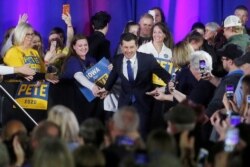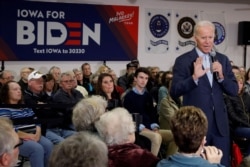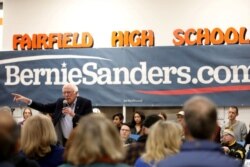Even though the temperature is just above freezing, and it isn't snowing, it's still not the most ideal weather to wait outside in a long line to listen to a politician.
But as he rubs his hands together to stay warm, stocking cap on his head, Darrel Morf is prepared.
"I love caucus season in Iowa. It's a chance to really listen to a lot of opinions and be thoughtful," he told VOA while waiting alongside hundreds of others to see South Bend, Indiana, mayor and one of the leading Democratic presidential candidates in Iowa, Pete Buttigieg, speak at an event at Cornell College.
Although there is much focus on the impeachment process targeting U.S. President Donald Trump, Morf admits there are other issues on his mind.
"How we are going to maintain security in the world at this point? I'm concerned about everything international," he says. "I think people worry a lot about climate here in Iowa — that would be another major concern."
Which is why he is braving cold weather and making an effort to attend political rallies and meetings in his state to listen to what the candidates have to offer.
"I think Iowans are very intentional. We listen carefully to what candidates are actually saying, we measure it, in terms of how we think they'll play in terms of actually being president," says Morf.
"We're in the middle of a fantastic swing through Iowa," Buttigieg told the Cornell College crowd where Morf, who arrived early, got a front-row seat for the event where Buttigieg acknowledged, "We see more and more caucus-goers ready to make a decision about the future of this country."
It's a decision Morf hasn't yet made himself.
"I'd probably lean towards Buttigieg right now," Morf says, "But (former Vice President Joe) Biden is probably someone I'd continue to look at, like (U.S. Senator from Minnesota) Amy Klobuchar."
The Midwest state of Iowa is the first in 2020 to host an election to decide who Democrats want to represent them in the general election against Republican Donald Trump in November.
Although the state is not as populous or diverse as many others, success in the Iowa caucuses — a meeting where voters gather to decide their preferred candidate — can make or break a political campaign.
"I know we're a small state and we're not as diverse," Morf explains, "but I think it gives us a chance to see candidates up close through new things in a way you can't do in media campaigns, and we take it seriously, and I don't think we have the biases people want to expect from us."
However, with weeks, not months left in the campaign in Iowa, the clock is ticking for candidates still left in the race to win the support of undecided voters like Morf.
"That's where you start to see the race, some of the people going up, some of the people going down," says University of Iowa political science professor Timothy Hagle. "Maybe we'll see a few people dropping out or at least nor participating in Iowa … so it's getting interesting."
Hagle says historic trends show that voter turnout in the Iowa caucus should favor Democrats this election cycle over the incumbent party in the White House — the Republicans.
"Their turnout is probably going to be way down — higher than it would be in a mid-term for them, but still down for a presidential year," he explained to VOA from his offices on campus in Iowa City. "Whereas for the Democrats, and especially given we have a fairly competitive race here in Iowa with again the way that we're seeing this volatility in terms of the polls and who seems to be ahead and all that, that's going to spur turnout. Particularly to the extent that Democrats can get other people excited about the possibility of unseating Trump."
William Clayton believes former Vice President Joe Biden is the best person to do that.
"I supported Joe Biden from the beginning," Clayton told VOA. "I see him as the best alternative with the most experience in government."
Clayton traveled from Wisconsin to Dubuque, Iowa, to attend a Biden campaign event on the campus of the local college.
Although his state votes several months later, Clayton wants to see the victor in the Iowa caucus be the one best positioned to win his rural Wisconsin district, which Claytons says is divided over Trump's presidency.
"Some of them are right behind him [Trump] no matter what, and there are others who don't like him at all."
But Iowa decides first, where Morf says he worries progressive contenders — like Massachusetts Senator Elizabeth Warren or Vermont Senator Bernie Sanders — may not be electable when the entire nation votes in November.
"In a general election," says Morf, "there are an awful lot of people who are in the middle, and they're going to look at this and make their decision on whether candidates are too extreme."
Those are concerns Sanders dismissed during one of his Iowa campaign stops.
"And the agenda we are fighting for, despite what some of my critics may say," Sanders told the audience, "is really not a radical agenda. It's what the American people want."
It's a part of the case Sanders and the rest of the field of Democratic candidates continue to make as they visit Iowa's 99 counties in search of support, in the final stretch of a campaign that reaches the finish line in the state on Feb. 3.









